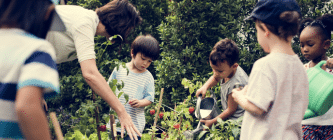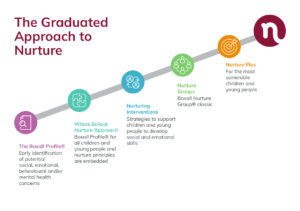All
“Just naughty”: the impact of understanding underlying needs
We know that a nurturing approach can have an incredible effect on the lives of children and young people, and we love to hear about the real-life impact it has in the schools we work with. The following case study was from a school on our Nurturing London Violence Reduction Unit Programme which finished in 2022. The storyteller is the head of inclusion and leads a nurture specialist support centre in North London.
____________________________________________________________
Our school had already embarked on a journey to transform our behaviour policy towards a much more nurturing approach that reflected our values and objectives as a school. My role was to facilitate this transformation with our members of staff, so when the programme came along I recognised the potential for what was offered to help us move the transformation along. The big difference for me was that this was tried-and-tested practice that provided a solid evidence base going back 50 years; I knew that having the kind of evidence you can’t argue with would help to convince some reluctant staff members that there was value and merit in adopting a more nurturing and trauma-informed approach to understanding and dealing with behaviour. Before we joined the programme, there were pockets of excellent nurturing practice already happening in the school, but this was by no means across the board.
Our school is lucky to have a Therapeutic Wellbeing Practitioner on staff who works with both children and staff. All staff had received previous training in supporting our pupils’ social and emotional development but I noticed that it was the ethos of individual teachers who were naturally more nurturing in their approach that was making a difference with individual pupils.
I feel that the main internal barrier we had as a school in terms of becoming more nurturing, was the fixed behaviourist mindset that many staff had in understanding behaviour. Some staff had pre-existing opinions about nurture somehow being a “soft approach that is all about cuddles”. This attitude, as well as the pressures to deliver the curriculum which is target based, left little inclination or time for staff to consider a more nurturing approach.
Additionally, the pandemic and resulting lockdowns and bubbles was a really big challenge to our whole school community. We experienced illness, with many of our staff becoming unwell and we also experienced loss, with two of our pupils losing parents to the virus.
There were three elements of the programme that were key to our school becoming a more nurturing place – training, resources and the relationship we have built with our nurtureuk consultant. The Wellbeing Box of resources was very well received by staff and pupils in our nurture centre, particularly the puppets. We find these very useful in communicating with our pupils and a useful tool to facilitate conversations and give pupils an effective way to voice their feelings and emotions.
Completing the Theory and Practice of Nurture Groups training fortified and solidified our practice in the nurture centre and gave me the confidence and knowledge to set up the physical environment in the most effective way. The course gave us the building blocks to inform more nurturing thinking and gave us the knowledge to explore the factors behind behaviour and to discuss and find solutions in-house. I found the relationship we built with our nurtureuk consultant through the project to be really helpful and this was also true for the wider staff who met her during training sessions. They felt that they could approach someone with specialist knowledge who could provide advice and answers for our specific context.
After we completed the nurture group training, I noticed positive changes in the way we practised in the nurture centre. This was especially evident in the work of the nursery nurses now as they are more empowered to integrate the curriculum into the daily practice. We discuss the planning for individual pupils together as a team and each staff member supports each other in implementing the plans, which is much more effective.
Having access to the Boxall Profile® Online has made it quick and easy for us to access and complete assessments for the pupils placed in our provision for a usual period of 12 weeks. The information from the Boxall Profile®, particularly from the Developmental Strands, makes it possible for us to focus the support and identify strategies that will be effective. Using the information, we are able to understand the complex needs behind the behaviour preventing the pupil from attending their mainstream classes at the time that they come to us. We are able to communicate to the school and the parents some of that insight into understanding the need better and we are also able to set expectations about the progress we hope to make in the time that the pupil is with us.
One of our pupils attended a mainstream school where the staff body had very little knowledge and experience of nurture. As a result of this, they had not managed to identify any of his underlying needs and was labelled as “just naughty” when he started with us. He was very explosive and appeared to need to maintain absolute control with both the adults and the other children in the classroom. He had a complicated family environment where there was a history of addiction and also a history of learning difficulties. We were able to identify his strengths very early on and were able to work with these as well as establishing a warm and positive relationship with his parents. Our knowledge and our willingness to find solutions has really paid off and he is a great success story of someone who would likely have been excluded from his mainstream environment and been seen as a failure. His success in our environment has seen him accepted at a smaller one-form entry school that has an established nurturing ethos, which was facilitated by our staff. His parents are overjoyed seeing his progress and seeing him settled in an environment where he will thrive.
____________________________________________________________
We are delighted to have been commissioned by the London Violence Reduction Unit to deliver a new programme alongside delivery partners Tender. The Inclusive and Nurturing Schools Programme aims to tackle school exclusions across 70 schools in seven London Boroughs.
If you’d like to find out more about our nurture training, please visit our website.
Supporting young people with exam results day
As we get closer towards the end of August, many young people will be feeling stressed as they await their exam results. They may be feeling a lot of pressure to meet expectations – be it their own, their family’s or their schools – and knowing the impact the results can have on their future plans.
The Six Principles of Nurture give us a greater understanding of how best to support our young people when they feel stressed or anxious. For example, exam result days feature in several major life transitions for young people; from GCSEs to further education, further education to higher education or employment, or university results day.
It’s vital for parents, carers and families to understand that all behaviour is communication and that providing a safe base for young people is key. Your young person may not be able to communicate the stress or anxiety they’re feeling prior to receiving their exam results, so may be withdrawn or isolated, or display challenging behaviour. By providing a safe base, your young person has the opportunity to understand and manage their emotions.
Here’s some of our top tips on how to support your young person in the run up to results day:
-
- Listen: Your young person may be experiencing a range of emotions as results day approaches. Providing time and space for them to talk is important, whilst acknowledging their hopes or worries, and any pressure they may be feeling.
- Celebrate the effort: Before results day arrives, celebrate how hard they have been working through exam season! Let them know you’re proud of how hard they worked, no matter their results.
- Make flexible plans for the day: Your young person may want to be distracted on the day, depending on their results. Ask them in advance if they have any ideas, or you could suggest a trip out, a walk, dinner out or a takeaway, a movie night, or spending time with friends. Each young person will handle their stress differently so be prepared for plans to change!
- On the day: Be on hand if possible to support them in whatever way they need. And remember that your words matter, so respond to their results carefully and conscientiously.
- Next steps: If your young person is disappointed in their results, they may not want to talk through the next steps on the day, so give them the time and space they need to process. Do some research or talk to the school to understand what options are available – whether it’s retakes, remarking or alternative courses – so that when they’re ready, you can support them to find the next best steps for them.
Remember: grades aren’t everything. Make sure your child feels celebrated and supported regardless of their results! For more information, please see the additional support linked below.
Support for young people:
- https://www.youngminds.org.uk/young-person/blog/exam-results-stress-advice-for-young-people/
- https://www.aqa.org.uk/student-and-parent-support/managing-stress-when-waiting-for-results
Support for parents:
- https://nationalcareers.service.gov.uk/explore-your-education-and-training-choices/exam-results/parent-guide
- https://www.youngminds.org.uk/parent/parents-a-z-mental-health-guide/exam-time/
The impact of nurture group training
We know that a nurturing approach can have an incredible effect on the lives of children and young people, and we love to hear about the real-life impact it has in the schools we work with. The following case study was from a school on our Nurturing London Violence Reduction Unit Programme which finished in 2022. The storyteller is a Senior Leader at a large community primary school in North-West London.
____________________________________________________________
At the start of the programme, our challenge was to see how we could include nurture practice to complement our existing practice. The Nurturing London Programme offered us the opportunity to look at our whole-school practice. We saw it as a perfect fit which allowed capacity for a nurturing approach to grow right across our school through the training and upskilling of our nurture group staff, in the first instance, and then for all staff. The programme never felt like an add-on, but rather a way of embedding and galvanising our vision of the practice we valued.
We had a foundational knowledge of attachment theory, but we felt that a consistent nurturing approach in our classroom and curriculum was just not there. Our staff had a mixed understanding of the principles of nurture, so there was a lack of consistency based on different beliefs of how behaviour should be managed. I think this resulted from a combination of misconceptions that viewed nurture as a “soft approach”, and also a lack of specialist knowledge and training in the concepts underpinning it. Staff needed to see what the actual work looked like and to observe for themselves the links with their existing practice. If this didn’t happen, we would be fighting against a tide of “zero tolerance” philosophy.
I would say that this binary view of having to choose between the opposing “soft” approach and “zero tolerance” in addressing behaviour was our biggest obstacle in our whole-school nurturing journey. I believe that this view is prevalent amongst our parents too, and it became more prevalent during the pandemic when we were quite isolated from parents. What we know is that there is always an individual story and context behind all behaviour, but this is sometimes hard to “sell” to parents. What I have seen is that when a teacher has a greater understanding of and experience with a nurturing approach, then it is easier to get the parents on board. We encourage nurture across the board, meaning that nurture infuses all of our relationships and our priorities as a school. We constantly make reference to nurture practice and its underlying principles to our parents.
At the start of the programme, we didn’t fully realise the breadth of what was being offered to us. Our Lead Consultant (LC) was instrumental in supporting us in the implementation of the training, staff capacity, timing and roll-out of everything we had access to. They were able to guide us at each point along the journey as to how we could build on our nurturing capacity by utilising the project offer. We knew right from the beginning that we wanted to build a lasting nurturing practice and the Theory and Practice of Nurture Groups training really helped us to build the capacity for long-term, sustainable practice; the cost of doing that outside of the project would have been prohibitive.
Utilising the Theory and Practice of Nurture Groups training offered as part of the programme to upskill three male members of staff in nurturing practice has been a core element of our success in creating a broader and wider perception of using this approach. The training and using the Boxall Profile® to create a depth of understanding of the roots of behaviour really demonstrated to them that this was not a “mumsy” approach, but something very powerful to create change. We’ve seen these members of staff transform from using a “military approach” to adopting more playful, meaningful and rich connections that have been hugely successful.
We have seen that early nurturing intervention has prevented and reduced instances of fixed term exclusions which are usually centred around one or two individuals with complex backgrounds and needs. Something that really stood out for me was seeing the “PRU to prison pipeline” that was shown to us at one of the monthly networking meetings. It really hit home, because before seeing this, I had always viewed exclusions and its consequences as a secondary school problem. I know that for at least one pupil with a very complex story, that if they had been able to attend a nurture group in Year 1, the outlook would be a different one. There is always more work to be done around exclusions, but we know where we want to be and we are headed in the right direction.
____________________________________________________________
We are delighted to have been commissioned by the London Violence Reduction Unit to deliver a new programme alongside delivery partners Tender. The Inclusive and Nurturing Schools Programme aims to tackle school exclusions across 70 schools in seven London Boroughs.
If you’d like to find out more about our Nurture Group training, please visit our website.
The Boxall Childhood Project | A whole-school approach to the Boxall Profile®
The Boxall Profile® is a unique online tool that assesses the social, emotional and mental development of pupils aged 4-18. We recommend that you use the Boxall Profile® to assess pupils across the whole school, as it gives headteachers and senior management teams a more rounded view of the wellbeing of the children and young people in their care.
In 2017, we launched a two-year project called the Boxall Childhood Project which looked at the benefits and challenges that schools encountered when completing Boxall Profiles® for the whole school.
As part of the pilot project, 40 schools in England were recruited and key members of staff were trained to use the Boxall Profile®. These key members of staff delivered training to their colleagues and put in place systems to assess all of their pupils. In total, more than 5,400 children and young people were assessed in Summer 2017 (during the first assessment period).
Findings
The data from these assessments showed that in an average primary school classroom, one in three children may have some social, emotional and behavioural difficulties. It also identified the following:
- 19 children had no apparent needs
- 7 children had some form of social/emotional or behavioural difficulties
- 4 children had high levels of needs in both social/emotional and behavioural difficulties (typically, three boys and one girl)
These figures show just how important it is to use the Boxall Profile® across the whole school as it helps schools to identify children and young people who need additional, more focused support through nurturing interventions, or as part of a nurture group.
Teacher reports also showed that 43% of children with high levels of social, emotional and behavioural difficulties do not access any form of wellbeing or mental health support – either at school or outside. There could be many reasons why these vulnerable children do not receive the support they need, for example schools may not be aware of the scale of difficulty experienced by these children.
The Boxall Childhood Project highlighted just how many children are affected by these social, emotional and behavioural difficulties, whilst also raising awareness of the importance of nurture, attachment and neuroscience, so that teachers can better understand and respond to difficult behaviour and the social, emotional and mental health needs of their pupils.
Our recommendations to schools
We believe the most effective way to support every child with their social, emotional and mental health needs or adverse childhood experiences, and equip teachers with the necessary tools for teaching to meet these needs, is to implement a whole-school nurturing approach.
That includes support for pupils and staff, working across the curriculum and involving pupils, governors and parents. It means provision for developing the wellbeing and resilience of everyone and targeted support for those who have significant difficulties. This can only happen with senior leadership commitment, staff development and a supportive culture.
The National Nurturing Schools Programme is a programme that allows staff to develop personally and professionally while embedding a nurturing culture throughout their schools, enhancing teaching and learning, promoting healthy outcomes for children and young people. This is achieved by focusing on emotional needs and development as well as academic learning in a whole-school environment. This involves embedding the Six Principles of Nurture and using the Boxall Profile® across the whole school.
The National Nurturing Schools Programme equips staff with the tools they need to implement a whole-school approach to supporting the social, emotional, mental health and wellbeing of all pupils and staff, allowing every child to become able to learn.
Beyond the Boxall Profile® for Young People: Whole-Class Strategies
We are delighted to announce the release of a new Boxall Profile® book – Beyond the Boxall Profile® for Young People: Whole-Class Strategies. Authors Adele Wilkinson and Carrie Thorne tell us more about this vital resource.
_________________________________________________
The original version of this book was released in 2019 and has proved to be an invaluable resource for schools who want to use the Boxall Profile® to help groups and classes of children, not just individual pupils. This made us want to create something similar, but with a secondary age focus.
We wanted to provide educators with a ‘dip in, dip out’ resource which would be really practical and useful; something which could provide simple but effective strategies that can be used throughout the school day. Whether they are used in the whole class or in small groups, the strategies aim to help young people build the social and emotional skills they need to succeed, allowing them to engage with their own behaviour and learning, and make the most of secondary school.
We intended for this resource to be used in multiple different ways and contexts; for example, if a teacher was aware that many young people in their class or group were struggling in strand A, they may ask themselves, ‘What can I do to help them? What will enhance my quality first teaching here?’ The book we have created has multiple ideas to help with questions like this. It is straightforward, practical and contains very simple starting points that as practitioners we might want and need.
A couple of our favourite sections include looking at form time and also thinking about the power of play in secondary – sometimes there is little thought given to these areas and yet so much time is spent in form for most secondary pupils! Are we always getting the most out of it? Is form time nurturing in all schools? If not, what can we do about that?
And play, is it considered ‘not very secondary’? Yet research tells us how important this fundamental right is for young people, for skill development and wellbeing. Do we think about this enough?
We know more and more schools are keen to support the social and emotional wellbeing of all the pupils in their care, and to this end assess every young person in their setting using the Boxall Profile®. For teaching staff, form tutors and support staff, using the Boxall Profile® as a classroom resource allows them to establish where social, emotional and behavioural needs lie and can help them to put in place strategies to target and respond appropriately to those needs. This will not only help the young people but will also help staff to implement what would be useful and more effective interventions as part of teaching and learning. Staff will be able to support all students, while ensuring a focus on inclusive practice and removing barriers to learning.
The resources included in the book have been trialled, tested and specifically selected to be used within secondary environments to allow staff to support the wellbeing of every young person, while at the same time fitting within the secondary curriculum. We are also grateful to the staff from our partner schools and settings who were so instrumental in the development of this resource. This was so helpful, and ensures that the book is relevant, realistic and current too.
It is suitable for mainstream and special secondary settings. We hope you like it and would love to hear which bits of the book you have found most useful.
__________________________________________
The Boxall Profile® is a way of understanding what lies behind pupils’ challenging behaviour to detect any unmet social, emotional and mental health needs. Once social and emotional needs are identified, education professionals can put in place targeted support to help children and young people develop those skills, and this in turn will help to improve their behaviour, mental health and wellbeing.
By using the Boxall Profile®, teachers can adopt the following strategies to help improve children and young people’s social, emotional and mental health:
- Giving pupils the opportunity to practise their social and emotional skills – for example by encouraging them to work in pairs and groups.
- Making time for social-emotional learning, either during targeted PSHE lessons or by embedding it throughout the curriculum.
- Modelling good social and emotional skills themselves, when interacting with pupils and other staff members.
The Boxall Profile® allows teachers to develop an inclusive, whole class approach that enables them to access all their pupils, by removing individual barriers to learning.
To get started or for more information about the Boxall Profile®, please take a look at our website.
Inclusive and Nurturing Schools Programme: six months in
The transformational Inclusive and Nurturing Schools (INS) Programme, commissioned by the London Violence Reduction Unit, is now in its sixth month of delivery. The programme aims to keep children safe, supported, and thriving in school, tackle exclusions, and ensure children and young people have healthy relationship behaviours and attitudes. Nurtureuk’s INS Programme Manager Jenny Perry shares her thoughts on the programme so far.
_____________________________________________________
We are now six months into the Inclusive and Nurturing Schools Programme working with 70 schools across seven London boroughs, alongside our colleagues from Tender Education and Arts. What a six months it has been!
Fifty schools across five boroughs have started their nurturing journey through the Inclusion strand, whilst an additional ten schools from one borough are well underway with their work on the Healthy Relationships strand.
A fundamental part of this programme, and what is at the core of the nurturing approach, is relationships. Strong, healthy, secure and trusting relationships help pupils to feel safe, staff to feel heard, and provide a sense of belonging for all.
Whilst a large part of my role as Programme Manager involves spreadsheets and Gantt charts, the beginning of each new programme gives me the great privilege of meeting with school senior leaders before they start. It is an opportunity to talk through the programme, answer any questions and, most importantly, listen to them talk with pride and hope about their schools, their staff and their pupils. Despite all that is going on around them and everything that they still have to wade through in this post-pandemic world, they are all realistic but optimistic about the future and they all, without exception, have placed their pupils and the school community at the centre of all they do. That is why they want to be part of the Inclusive and Nurturing School’s programme.
“This has come at the perfect time” is a phrase I have heard over and over again from head teachers and inclusion leads. The Covid-19 pandemic, the current cost of living crisis, and a society that shares negativity and doom on social media at every opportunity, is having a huge impact on the social, emotional and mental health of our children, their families and our teachers.
Nurture helps to tackle this by getting to the root of children’s social, emotional and mental health difficulties and provide schools with the help they need to deliver the right support. It improves attendance, behaviour and attainment and ensures every child is able to learn. It supports schools in strengthening the relationships they have with all members of the community. Through the Healthy Relationships strand of the programme, Tender Education and Arts aim to empower the whole school community to address sexual harassment and gender-based violence by providing education, training and guidance.
The INS Programme offers participating schools training on a range of subjects including the Boxall Profile® Online, resources, activities and enrichment days to support training or to use with young people in the classroom, expert-led networking opportunities, and bespoke consultancy so that we are meeting the needs of every individual school.
The importance of transitions in children’s lives: managing successful transition to the summer holidays
On a daily basis, there are numerous transitions children and young people make in school, e.g. between sessions and classes and between different adults. Our education professionals know that changes in routine are invariably difficult for some children and young people and need to be carefully managed with preparation and support. It is often perceived that the summer holidays are something which all parents and children look forward to but in fact, for some of our more vulnerable children and young people and their families or carers, this can be a challenging time of the year.
Structure and routine reassures children and young people in need of a nurturing approach and often the last weeks of school will be different from the norm, so they may well be unsettled to begin with. This could mean that they are dysregulated or easily upset, even though they are theoretically “looking forward” to no more school for six weeks. It is not just an issue for children and young people either, even adults can find a change in the normal routine challenging as differences in routine can affect the way we usually interact with our children and young people leading to uncertainty as to how to best support them.
Here at nurtureuk we know it is important to plan for transition and support it, with a view to reducing anxiety and promoting security. We have collated a few ideas for parents and carers for you here to help with that transition with some helpful links to free resources and advice to ensure that the summer holidays are fun and enjoyable for everyone. Before you look at the links here is some advice for your holiday plans from a nurturing approach perspective:
As always, we advocate developmentally appropriate approaches to ensure that each child or young person is learning and having fun at their own pace and level. When we support at their stage not age, we break down the barriers to learning and engagement and tap into the things that they enjoy and respond to, leading to renewed confidence and a sense of fun. When you look at the resources we have shared with you think of the following points:
- Could my child access this activity as it stands?
- How can I simplify this? (Through short achievable steps for example)
- How can I make this more challenging? (Some children and young people who need a nurturing approach may be academically and intellectually strong and enjoy being challenged.)
- What are my child’s strengths, how can I make sure I utilise them in this activity?
- Can I build their interests into this activity?
- Using this as inspiration, have I got any ideas like this myself which I can build into further plans?
- How can I make sure this is fun? Fun, laughter, and joy are key for positive regard and building trusting, loving relationships. When trusting bonds are created the limbic system deep within our brains responds and creates a feeling of warmth and connectivity that can help your child grow in confidence and self-esteem, leading to a sense of feeling safe enough to take the risk to learn something new.
Wishing you all a happy and reviving summer break and a chance to recharge for the Autumn Term.
Resources, advice and information
1. Lucy Carmen from Parents Digest has some great advice called Six Tips for Six Weeks, which are:
- Consider holding onto some routine while being adaptable.
- Get talking.
- Have plans for the first week.
- Keep up with friends over the summer.
- Keep a record.
- Don’t feel you have to fill every moment.
She gives detail to these ideas and lots of advice and information to help you and your child have a successful and happy summer along with links to some great summer resources from Twinkle.
2. Education Specialist Katrin Harrow from Family Futures provides some useful tips on how to cope with and manage some changes and transitions your child might be facing during the summer break. The article includes discussion around how it may affect looked after or adopted children. She provides us with 8 tips for the summer, with really good ideas and advice.
3. Our final pick is a great blog from the Foster for Coventry website, which has some top tips for the summer break from parents and foster carers, for example:
“We put a massive piece of paper on the wall with ‘this holiday I would like to…’ in the middle. Everyone can write ideas on. It can range from the everyday ‘play on my scooter’ to the more adventurous ‘climb a mountain’ or mindful ‘watch a sunset’ or educational ‘geek stuff’ or even ‘eat chocolate’!” – Sarah
“We saw an idea on the internet, and we now have a ‘boredom jar’ at home. We put ideas for activities in there – like Lego challenges, do a jigsaw, doodle, write a funny poem, find a bug in the garden – but also jobs that need doing around the house, so when they say “I’m bored” they get to pick something from the jar. It’s a bit of a gamble for them, but it’s also seen as a game. It seems to work!” – Scott
We love this blog because these are real parents and tried and tested ideas!
Celebrate your nurturing journey with a nurtureuk award
We love celebrating the nurturing journey of our schools! We understand the commitment and hard work that is needed to implement a new culture and ethos that puts the social, emotional and mental health needs of pupils at the heart of education practice. That’s why at nurtureuk we’ve created two awards to recognise outstanding nurture provision: the National Nurturing School Award (NNSA) focusing on a whole-school approach, and the Marjorie Boxall Quality Mark Award (MBQMA) celebrating nurture group provision.
Our National Nurturing School Award celebrates schools who have completed the National Nurturing Schools Programme (NNSP) and have successfully created a nurturing culture that responds to the social, emotional and mental health needs of its pupils. Assessed against the NNSP standards in areas such as stakeholders, delivery, and leadership and management, successful schools retain the award for three years, after which they have to reapply.
Pupils attending a National Nurturing School benefit from a whole-school approach that places their strengths and needs at the heart of practice, enabling them to flourish and be the best they can be. The culture helps to grow their confidence whilst improving their attendance and attainment. The award also demonstrates to prospective parents, school inspectors, and the local community the school’s commitment to developing an inclusive ethos where every voice counts.
“The whole process of achieving the [National Nurturing School] award has not been a chore, it’s been a celebration every step of the way.” – Virtual School Kent, 2022
Our Marjorie Boxall Quality Mark Award celebrates outstanding ‘classic Boxall’ nurture group provision. The award was established and refined by key figures in the development of the nurture group model, including Marjorie Boxall herself. The award recognises the dedication and specialist skills of the nurture group staff, and their commitment to supporting children and young people.
Schools delivering the Boxall Nurture Group® are assessed against a set of quality standards derived from the Six Principles of Nurture and linked to the use of the Boxall Profile® assessment tool. As with the National Nurturing School Award, the MBQMA highlights to external stakeholders the positive impact of a nurture group on pupils who, for a variety of reasons, may be struggling to access the curriculum in a mainstream classroom.
“It was a very positive experience and it gave us the opportunity to celebrate nurture throughout the whole school. The children were eager to talk about their nurture journey too. I know there will be lots of nurture teachers eager to apply for the reaccreditation and I will be highly recommending it to them all. We are overjoyed to receive this award!” – MBQMA school, 2023
As increasing numbers of schools are turning to nurture interventions to respond to the decline in school attendance, attainment and behaviour, it is vital that we celebrate nurture provision that responds to the social, emotional and mental health needs of all pupils, enabling them to access the education they deserve.
You can find all our current award recipients on our Awards page. If you’re interested in applying for one of our awards, you can find out more via our website.
Van Gogh School: How nurture is transforming pupils’ lives
A calm, positive, happy place where children and adults have high expectations of themselves and others and understand how to manage their emotions when life gets tough. Is this a magical land, or a vision of the distant future? No, it’s a school environment that exists here and now, in a deprived area of South London.
This month I had the pleasure of spending time at Van Gogh Primary School in Stockwell. The school took part in our recent Nurturing London programme, funded by London’s Violence Reduction Unit.
When you arrive at Van Gogh, the impact of nurture is immediately evident. From the warm and welcoming staff on the school gates who ensure children have been properly fed, to those checking in on children’s emotional states throughout the day – nurture permeates the school, filling every classroom, corridor and lesson plan.
At Van Gogh, children are thriving and learning like never before, truly engaged in their education and enjoying positive relationships and play.
This is an impressive turnaround for a school which in 2018 was forced to close its doors due to serious concerns about financial mismanagement and governance together with an inadequate Ofsted rating.
The school became Van Gogh when it joined the Dunraven Educational Trust. The Trust has developed provision significantly since then and supported headteacher Nadine Bernard to create a truly flourishing school.
Nadine puts the huge improvement in pupils’ social, emotional and mental health, down to the nurturing journey the school has been on, building on the work of founding headteacher, Paul Robinson. As part of the Nurturing London programme, Van Gogh used nurtureuk’s Boxall Profile® to identify children’s needs. The school is still undergoing our National Nurturing Schools Programme, which is allowing it to embed nurture throughout the school culture. Staff also run nurture groups for children with a high level of need.
Nadine and her team have focused strongly on building good relationships in school and the wider community. The Six Principles of Nurture are evident in all they do. Families feel part of the setting and communication with parents is strong. Teaching staff have also worked hard to ensure children can regulate themselves, and understand what is expected of them in school. Punishment and sanctions have been replaced with a focus on character development.
Department for Education representatives joined me at the visit to Van Gogh and we were all bowled over by how calm and happy pupils were and how much they genuinely enjoyed learning.
Nadine shared some impressive data on improvements in behaviour and attendance, and told powerful stories about the achievements of children who had suffered traumas including domestic violence, bereavement and separation from their loved ones. But the children, and the positive energy they exuded, showed us the results for themselves.
This is what nurturing education looks like and what I believe should be the norm across all schools in the UK.
A recent report from the Children and Young People’s Mental Health Coalition (CYPMHC) on Behaviour and Mental Health in Schools, revealed that sanction-based behaviour management techniques leave some young people feeling “worthless, invisible and disappointed in themselves,” and that these techniques led to them disliking school and experiencing increased feelings of anxiety.
Just walking into Van Gogh School, we could see that pupils and staff felt confident, heard, valued and really enjoyed being in school – pupils are truly ready and able to learn.
Similarly to CYPMHC’S findings, a new report from the University of Cambridge’s Dr Laura Oxley – highlighted in TES magazine – claims that “the promotion of a ‘sanctions-based’ approach to managing behaviour in government guidance is contributing to an escalation of challenging activity and punitive responses in schools.”
The report found that the sanctions-based approach is leading to worsening behaviour cultures, and goes on to warn that: “School leaders in England feel compelled to continue using a system of escalating punitive measures to manage student behaviour, even though they recognise that it fails some pupils.”
This needs to change. Teachers and schools need to feel confident and supported to use tried and tested approaches to manage behaviour in their schools that prioritise children’s wellbeing. Moving away from punitive approaches today will help to create the future young person we all want to see; confident, able, emotionally aware, happy individuals who are ambitious for themselves and others. We saw this in abundance at Van Gogh.
As one of the staff members said, the nurture approach works for staff and pupils because “it’s natural and normal.” I would love to see a future where this is being said in all schools across the country.
By Arti Sharma, CEO, nurtureuk
The impact of a whole-school approach to nurture
Children and young people are struggling with social, emotional and mental health (SEMH) needs like never before. According to the Mental Health Foundation, 75% of children and young people who experience mental health problems aren’t getting the support they need. This greatly affects pupils’ ability to engage with education and learn effectively, which often leads to a decline in school attendance, attainment and behaviour.
More and more schools are turning to nurturing interventions to help address these issues. The nurturing approach is a tried and tested way of helping children and young people develop the vital social skills, confidence and self-esteem needed to help them engage with education. It helps teachers to identify, understand and address individual pupils’ needs, and gives them the tools they need to provide the right support.
But what does a whole-school approach to nurture look like?
A whole-school approach to nurture involves embedding the Six Principles of Nurture throughout the school and assessing all children and young people’s social, emotional and mental health needs using the Boxall Profile®. A nurturing approach can have the greatest impact when it’s not used in isolation, as it ensures every pupil gets the right support.
The whole-school approach forms the second stage of our graduated approach to nurture:
The process of embedding the Six Principles of Nurture and developing a nurturing culture will be different for every school. It isn’t about signing up to an off-the-shelf programme, but about looking at a school’s core beliefs, its knowledge of its pupils’ needs, and its commitment to supporting them to achieve their very best.
“Since adopting a more nurturing approach… our school completely changed our behaviour system, moving away from exclusions and moving towards creating a space where young people build and rebuild relationships with staff across the school. We have numerous pupils who have not been excluded because nurture has changed the way we meet their needs. Now we check-in more, make space for them to voice their needs and make more reasonable adjustments and we find that we are managing them, they are managing themselves and they are staying in mainstream education. The unseen work of the nurturing approach is reaching across the school and our pupils are aware that things have changed.” (Nurturing London VRU school, 2022)
Using the Boxall Profile® to assess all pupils allows staff to identify many more children with SEMH needs, particularly those who were ‘hidden’ or previously overlooked, according to the Now You See Us report (2019). Once identified, staff can put appropriate individual or whole-class strategies in place to ensure all pupils get the support they need to help them become able to learn.
“We have been able to Boxall Profile® the whole school and implement strategies that are beneficially impacting whole classes. We have looked at these results and… included more nurture activities, which has resulted in the children spending curriculum time more focused and with more intent.” (Nurturing Kent School, 2022)
If you are interested in implementing a whole-school approach to nurture, our National Nurturing Schools Programme helps to equip staff with the tools, training and support needed to develop a nurturing culture that enables pupils to thrive. Schools who complete the programme can also apply for the National Nurturing Schools Award. For more information, please visit our website.












